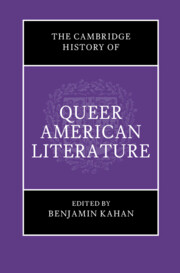Book contents
- The Cambridge History of Queer American Literature
- The Cambridge History of Queer American Literature
- Copyright page
- Contents
- Figures
- Tables
- Contributors
- Acknowledgments
- Introduction
- Part I Synchronic Histories of American Sexuality
- The Sexuality of American History
- Queer Literary Movements
- 9 Trans-ing Transcendentalism
- 10 Sentimental Literature and the Erotics of Identification
- 11 Queer Modernism and Misfit Identity
- 12 Imperialism and the Queer Harlem Renaissance
- 13 The Mystical Sexuality of the Beats and the Berkeley Renaissance
- 14 The New York School’s Queer Happiness
- 15 Chicana and Latina Lesbian Feminists and the Radical Making of Anthological Archives of Willfulness
- 16 Queer Literature after Queer Theory
- Part II Diachronic Histories of American Sexuality
- Part III Queer Methods
- Index
13 - The Mystical Sexuality of the Beats and the Berkeley Renaissance
from Queer Literary Movements
Published online by Cambridge University Press: 17 May 2024
- The Cambridge History of Queer American Literature
- The Cambridge History of Queer American Literature
- Copyright page
- Contents
- Figures
- Tables
- Contributors
- Acknowledgments
- Introduction
- Part I Synchronic Histories of American Sexuality
- The Sexuality of American History
- Queer Literary Movements
- 9 Trans-ing Transcendentalism
- 10 Sentimental Literature and the Erotics of Identification
- 11 Queer Modernism and Misfit Identity
- 12 Imperialism and the Queer Harlem Renaissance
- 13 The Mystical Sexuality of the Beats and the Berkeley Renaissance
- 14 The New York School’s Queer Happiness
- 15 Chicana and Latina Lesbian Feminists and the Radical Making of Anthological Archives of Willfulness
- 16 Queer Literature after Queer Theory
- Part II Diachronic Histories of American Sexuality
- Part III Queer Methods
- Index
Summary
The history of sodomy carries a long association with magic, the occult, and alternative forms of knowledge. This connection persists in relation to homosexuality, most obviously in the figure of the fairie (with its associations of enchantment) and with the poetic experience of “magic” or “mystical” forms of alternative knowledge in queer countercultures. This chapter explores the way that two gay San Francisco Bay Area groups — the Beats and the Berkeley Renaissance — took magic, spiritualism, and other forms of alternative knowledge as central to their poetics and authorial practice. Mystical forms of sexuality offer modes of contact at a time when physical intimacy was outlawed and heavily policed in midcentury America. Further, this chapter argues, contemporary poets writing in the wake of these midcentury movements offer new ways to understand how these mystical forms of sexuality constitute institutional critique.
Keywords
- Type
- Chapter
- Information
- The Cambridge History of Queer American Literature , pp. 239 - 254Publisher: Cambridge University PressPrint publication year: 2024

